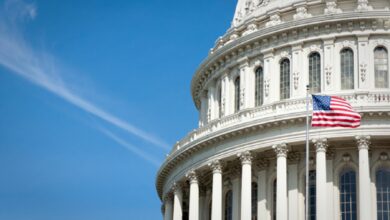Dear Sen. Roger Marshall: Medicaid expansion would open doors for rural families, mental health

Hello, Sen. Roger Marshall:
I imagine you meet many people as you visit cities across the great state of Kansas. It would be bold of someone to assume that you remember them. I am going to be bold in assuming that you remember me from your visit to the Greater Topeka Partnership office in August.
You met with small business owners in Topeka to understand the challenges we faced and how your office might be able to help. I was the minority business owner who described how funding for small businesses was not evenly distributed during the pandemic because the definition of small business is so narrowly focused that it overlooked solo practitioners like me. I also shared how larger nonprofits receive funding over smaller ones because our voice is not big enough to be heard.
This brings me to the purpose for my letter with your position of Medicaid expansion in Kansas.
Expanding Medicaid here means that thousands of individuals not insured would have access to health care. It’s that simple. Medicaid expansion means that I can provide services to families struggling to recover from life challenges that disrupt their functioning, like the aftermath of the pandemic. Children, older individuals and, yes, even the farm families that you spent time with recently would be able to receive help when needed.
As I explained during the meeting, current policies prevent me from providing critical services to the families of children in my private practice. I am a child trauma therapist. Treating children is what I do well. But I am smart enough to recognize that treating children without treating the family is tantamount to taking a child out of a starving home and giving them a three-course meal once a week. The child would still starve to death, it would just take longer.
This was one of many reasons I started a nonprofit. In doing so, I have been able to be creative in my approach to helping families in Fairview, Derby in the south, Leavenworth in the east and Quinter in the west. Yes, I have served many farm families in Kansas, but not to the degree that I did during the pandemic.
Why? Because it costs money that I am not able to access. The billions of dollars that have been released by the federal government trickle down to drips by the time anyone considers a solo practitioner with a nonprofit who is willing to drive across the state to provide mental health services to struggling families. And yet the great state of Kansas is ranked 50th and 51st in prevalence of mental illness and lower access to care for youths and adults respectively.
Everybody is talking about the need for mental health services. In fact, I will be sitting on a webinar soon in which national and state organizations tout the importance of H.R. 3073. I struggle to contact anyone regarding the need for this bill because my fear is it will result in more of the same funding and minimal outcomes for those in need.
This, Sen. Marshall, is why Medicaid expansion is critical to Kansas. I do not have the bandwidth to explain the correlation between the mental health of parents and behavior concerns of children. But I know that expanding Medicaid can address the problem.
Your suggestion of accessing services through community mental health centers is good. But what if the family does not have a vehicle or there is no mental health center within walking distance? That is the state of many families in Kansas. If a family in Ulysses experiences a mental health crisis, the closest provider is 30 miles away. But there is no guarantee that they are available, or that they can afford to provide services.
Medicaid expansion means access to federal funding that strengthens the state budget and eventually creates opportunity for individuals in private practice to improve Medicaid reimbursement rates.
This brings me to your position on student loan forgiveness. As you are aware, degrees and licensing to practice are an expense that never goes away. Individuals with a sincere desire to serve do not take our charge lightly. While income is important, it is not our No. 1 priority. Our desire is to improve the lives of those in our communities. Many of us, however, are forced to work multiple jobs to repay student loans and all the expenses related to maintaining a license.
If we chose to work for financial gain, it would be to the exclusion of Medicaid patients. We fill a gap that some cannot and others will not. Student loan forgiveness would make what we do much more rewarding because it removes a weight that many of us struggle to carry.
I started this letter saying I was bold enough to assume that you would remember me from the meeting at the Greater Topeka Partnership office. I sat beside the gentleman who reminded you of your obligation as a representative of all Kansans. While I do not speak for all Kansans, I do ask, on behalf of the helping professionals who meet other Kansans at the point of their need, that you reconsider your positions on student loan forgiveness and Medicaid expansion.
Respectfully,
Tara D. Wallace, MSW, LSCSW, CTF-CBT/PSB, RYT, SLC
Tara D. Wallace is a licensed clinician and trauma therapist in Topeka. Through its opinion section, Kansas Reflector works to amplify the voices of people who are affected by public policies or excluded from public debate. Find information, including how to submit your own commentary, here.





